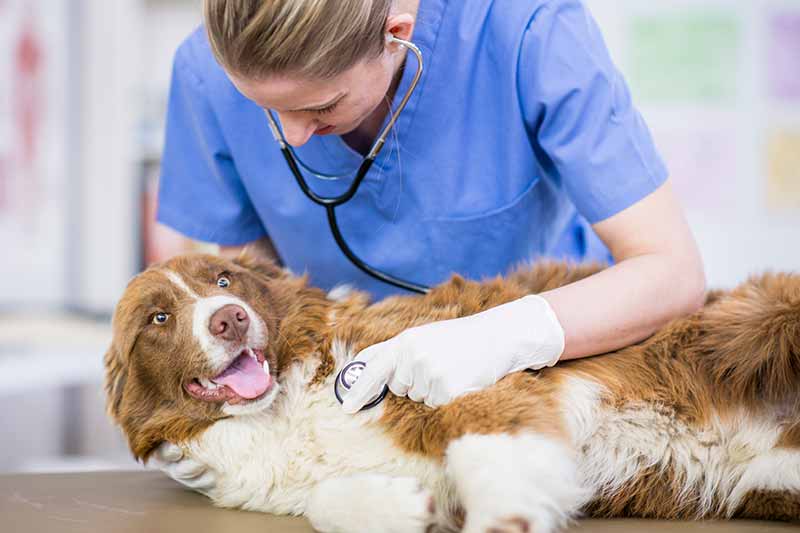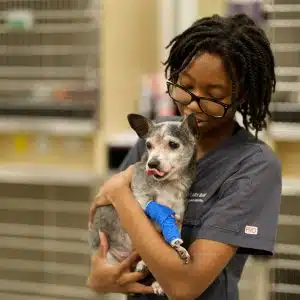How to prepare before your pet’s Pet Cancer Surgery
Comprehensive Guide to the Solutions Offered by a Veterinary Oncologist
Veterinary oncology incorporates a large array of solutions focused on treating and diagnosing cancer cells in family pets. Veterinary Oncology Services. Oncologists employ advanced analysis strategies and use various treatment choices tailored per pet's needs. They also focus on encouraging care and give beneficial sources for pet dog proprietors. Recognizing these solutions is important for making notified choices. What particular elements of vet oncology can especially affect an animal's therapy journey?
Understanding Veterinary Oncology
Veterinary oncology is a specialized area concentrated on treating and detecting cancer in pets. This self-control includes a vast array of strategies, from medical therapies such as chemotherapy and immunotherapy to medical treatments focused on getting rid of tumors. Veterinary oncologists are trained to recognize the special manifestations of cancer in numerous types, enabling them to customize treatment strategies to individual clients.
In addition to traditional therapies, vet oncology stresses supportive treatment, which plays a necessary duty in boosting the quality of life for affected pets. This consists of pain administration, dietary support, and palliative treatment choices. Cooperation with pet dog proprietors is critical, as they are integral to decision-making regarding their pet dogs' therapy paths. As research developments, vet oncology remains to evolve, using brand-new hope and enhanced outcomes for family pets diagnosed with cancer. Overall, this field is essential for resolving the complexities of cancer cells in companion pets.
Advanced Diagnostic Techniques
Advanced diagnostic techniques play an important role in veterinary oncology, offering crucial understandings right into the presence and degree of cancer cells in animals. Imaging techniques such as ultrasound, CT scans, and MRI are generally employed to imagine lumps and evaluate their qualities. In addition, biopsy treatments are essential for obtaining cells samples, permitting for definitive diagnosis and tailored therapy strategies.
Imaging Modalities Utilized
Imaging modalities play a crucial role in the medical diagnosis and management of cancer in pets. Vet oncologists make use of different advanced imaging methods to examine tumor size, transition, and visibility. Radiography, or X-rays, offers an initial view of bone and upper body conditions, while ultrasound provides real-time imaging of soft tissues, enabling for detailed evaluation of inner organs. Computed tomography (CT) enhances visualization of complicated physiological structures and enables 3D restorations, helping in exact tumor localization. Magnetic resonance imaging (MRI) is important for soft tissue distinction, particularly in brain lumps. Furthermore, nuclear medication methods such as positron emission tomography (PET DOG) aid recognize metabolic task within lumps. Collectively, these techniques boost analysis accuracy, assisting efficient treatment strategies for oncological patients.
Biopsy Procedures Described
Following the preliminary evaluation with imaging techniques, obtaining a definitive diagnosis usually needs tissue sampling through biopsy treatments. Vet oncologists make use of various biopsy methods based on the lump's area and qualities. Great needle desire (FNA) is a minimally intrusive technique that removes cells for cytological evaluation, perfect for surface masses. Core needle biopsies supply bigger tissue examples and are beneficial for deeper tumors, enabling for histopathological evaluation. Surgical biopsies involve excising a section or the whole lump, promoting comprehensive assessment. These treatments not only verify the existence of cancer cells but also assist determine its type and quality, directing therapy choices. Each biopsy strategy is selected very carefully to stabilize diagnostic accuracy with patient safety and security and comfort.
Therapy Options for Cancer Cells in Pet dogs
When a pet is diagnosed with cancer, a variety of treatment choices appear to aid improve and take care of the disease high quality of life. Vet oncologists normally recommend a multidisciplinary approach customized to the private animal's needs, which might include surgical procedure, radiation therapy, immunotherapy, or alternate therapies.
Surgical procedure is usually utilized to get rid of growths and afflicted tissues, potentially leading to total remission sometimes. Radiation therapy intends to destroy and target cancer cells, reducing lump size and reducing signs - Board Certified Veterinary Oncologist. Immunotherapy takes advantage of the family pet's body immune system to combat cancer cells a lot more efficiently, while alternate treatments might include acupuncture or herbal supplements to sustain general health
Each therapy option brings its very own benefits and risks, and veterinary oncologists function carefully with pet proprietors to make a thorough strategy that straightens with the animal's particular diagnosis and the owner's desires. The ultimate goal is to enhance the pet's comfort and top quality of life throughout their cancer cells trip.
Chemotherapy for Pets
Radiation treatment is a typical therapy choice for family pets diagnosed with cancer and is usually used together with various other treatments described by veterinary oncologists. This therapy involves the administration of certain medications developed to destroy and target cancer cells, consequently decreasing lump size and avoiding the spread of the illness. Vet oncologists customize radiation treatment protocols based upon the sort of cancer cells, the animal's overall wellness, and the desired treatment outcome.
Adverse effects can happen, as these medications might likewise affect healthy and balanced cells. Usual responses include nausea, vomiting, and momentary adjustments in cravings - Pet Cancer Surgery. Vet oncologists are furnished to handle these adverse effects efficiently, guaranteeing the family pet's convenience throughout the treatment process. Regular monitoring via blood examinations and follow-up visits is vital to examine the family pet's feedback to chemotherapy and make needed changes. Inevitably, chemotherapy can supply significant benefits, improving the lifestyle for pet dogs encountering cancer cells diagnoses

Radiation Treatment in Vet Medicine
Radiation therapy works as a reliable therapy alternative for pet dogs identified with localized tumors, providing a targeted strategy to cancer administration. This strategy utilizes high-energy radiation to damage the DNA of cancer cells, preventing their capacity to proliferate. It is especially advantageous for lumps that are not responsive to surgical removal or for cases where surgical treatment may not be viable as a result of the tumor's location.
Veterinary oncologists customize radiation protocols based on growth place, size, and type, along with the pet's general health and wellness. Treatment can be supplied using external beam of light radiation or brachytherapy, each with distinctive benefits. Typically, multiple sessions are called for to maximize effectiveness while decreasing negative effects.
Pets may experience short-term reactions such as skin inflammation, the total purpose is to reduce tumors and reduce symptoms, inevitably boosting the animal's diagnosis and high quality of life. Accordingly, radiation treatment plays an important function in complete cancer treatment.
Palliative Care and Quality of Life
Palliative treatment in veterinary oncology concentrates on improving the lifestyle for family pets facing terminal diseases, guaranteeing comfort and self-respect in their last days. This specific technique prioritizes pain management, symptom control, and psychological support. Veterinary oncologists evaluate each animal's individual demands, tailoring interventions to minimize discomfort and boost general well-being.
Strategies may include administering drugs for pain relief, handling queasiness, and dealing with various other stressful signs. In addition, dietary support is often provided to keep toughness and improve appetite. The emotional facet of palliative treatment is just as vital; producing a tranquil environment assists decrease anxiousness for both pet dog and owner.
Eventually, the objective of palliative care is to allow pet dogs to appreciate their staying time with as much joy and dignity as possible. By concentrating on comfort and high quality of life, veterinary oncologists play an essential duty in making sure that animals and their family members navigate this difficult trip with empathy and understanding.
Assistance for Animal Owners During Therapy

Emotional Guidance for Owners
Charting the psychological landscape during a family pet's cancer cells therapy can be an overwhelming experience for owners. The uncertainty surrounding medical diagnosis and prognosis can lead to feelings of despair, helplessness, and anxiousness. Vet oncologists identify the value of psychological support and often supply guidance to assist owners navigate this hard trip. Communication is vital; going over treatment alternatives and prospective outcomes can relieve some worries. Furthermore, providing peace of mind that emotional reactions are valid fosters an encouraging environment. Numerous oncology facilities might additionally suggest support groups or therapy services customized for animal owners, promoting shared experiences. Motivating owners to prioritize self-care during this Pet Cancer Surgery time is essential, as their psychological well-being directly influences their family pet's convenience and overall treatment experience.

Resources and Educational Materials
Steering with the complexities of a family pet's cancer cells therapy can be daunting for proprietors, making access to dependable resources and educational products vital. Veterinary oncologists frequently give a variety of handouts, pamphlets, and online materials that discuss treatment alternatives, prospective adverse effects, and treatment strategies. These resources help demystify the process and encourage pet dog proprietors to make enlightened choices. Additionally, numerous oncology clinics use access to support groups and forums where owners can get in touch with others dealing with similar difficulties, cultivating a sense of neighborhood. Educational webinars and seminars performed by vet professionals even more improve understanding, ensuring that proprietors are well-appointed to browse their family pet's journey with cancer therapy with self-confidence and expertise.
Frequently Asked Questions
Just How Can I Prepare My Family Pet for a Vet Oncology Go To?
Preparing a family pet for a vet oncology go to involves gathering clinical records, keeping in mind signs and symptoms, and guaranteeing the animal is comfy. A calm demeanor and familiar things can aid alleviate anxiousness throughout the visit.
What Are the Indications My Pet May Have Cancer Cells?
Indications that an animal might have cancer cells consist of unusual fat burning, relentless throwing up or looseness of the bowels, unusual swellings or swellings, lethargy, changes in cravings, difficulty breathing, and changes in behavior. Trigger veterinary attention is necessary.
Exactly How Can I Assistance My Family Pet Mentally Throughout Therapy?
Supporting an animal emotionally during therapy includes providing comfort, keeping regimens, offering mild love, and making certain a tranquil setting. Engaging in quiet play and normal friendship aids alleviate anxiety and cultivates a complacency.
Are There Different Therapies for Pet Dogs With Cancer?
Alternative treatments for pet dogs with cancer include acupuncture, natural treatments, and dietary support. These approaches may enhance conventional therapies, advertising overall wellness. Consulting with a vet is crucial for risk-free and reliable assimilation of alternate treatments.
What Expenses Should I Anticipate for Vet Oncology Solutions?
The expected costs for veterinary oncology solutions can differ considerably, often influenced by diagnostics, therapies, and continuous care. Family pet proprietors must get ready for expenditures varying from appointments to specialized therapies, mirroring the complexity of cancer administration.
Collaboration with pet proprietors is essential, as they are indispensable to decision-making concerning their pet dogs' therapy paths. Each therapy alternative lugs its own benefits and risks, and vet oncologists function very closely with family pet owners to develop a detailed strategy that aligns with the animal's specific diagnosis and the owner's dreams. Pets might experience short-term responses such as skin irritation, the general objective is to reduce growths and ease signs, eventually boosting the animal's prognosis and quality of life. Support for family pet owners during therapy is essential in guiding through the emotional difficulties connected with an animal's cancer cells medical diagnosis. Preparing a pet dog for a vet oncology go to includes celebration clinical records, noting signs and symptoms, and ensuring the family pet is comfy.